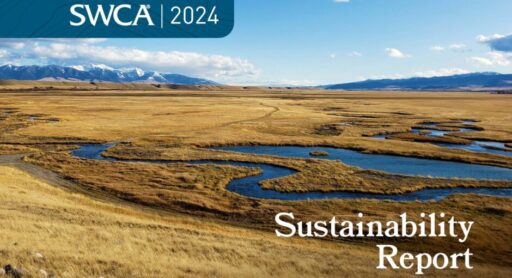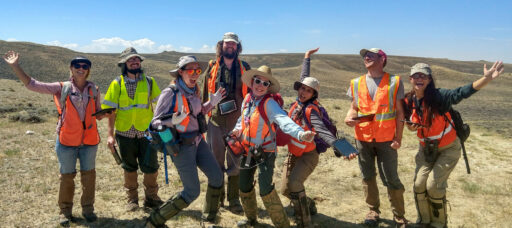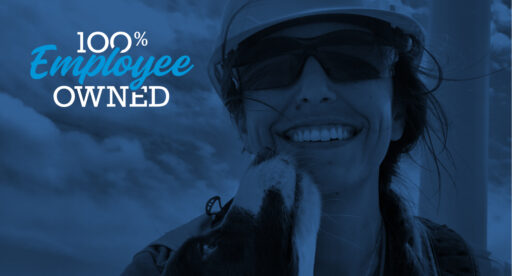2025
Comparably’s Best Company Outlook
* Providing engineering services in these locations through SWCA Environmental Consulting & Engineering, Inc., an affiliate of SWCA.

From the experts we hire, to the clients we partner with, our greatest opportunity for success lies in our ability to bring the best team together for every project.
That’s why:

At SWCA, sustainability means balancing humanity’s social, economic, and environmental needs to provide a healthy planet for future generations.

SWCA employs smart, talented, problem-solvers dedicated to our purpose of preserving natural and cultural resources for tomorrow while enabling projects that benefit people today.

At SWCA, you’re not just an employee. You’re an owner. Everyone you work with has a stake in your success, so your hard work pays off – for the clients, for the company, and for your retirement goals.
SWCA Featured in the Q1 2025 Climate Change Business Journal Executive Review Edition
Featured in the Q1 2025 Executive Review Edition of the Climate Change Business Journal, this excerpt from SWCA’s Executive Q&A spotlights how we are scaling global impact, deepening sustainability consulting expertise, advancing technology offerings, maintaining our commitment to employee ownership, and more. Read on for insights from Joseph Fluder, CEO and President, Linda Lannen, former Chief Technology Officer, Anne Cabrera, Client Services Vice President, and John Platko, Sustainability and Management Consulting Vice President.
SWCA: Several key factors drove our growth in 2024: our commitment to delivering for our clients, supporting our employees at all levels and across different roles, strategically diversifying our services and geographic reach – all while keeping sound science and creative solutions top of mind.
Our team is adept at responding to market demands. SWCA remains flexible and agile in our approach to sustaining the business. We saw organic growth in markets that will continue to have future demand, such as sustainability advisory and implementation, engineering (particularly for renewable energy developments and ecological restoration), and climate-driven services (including wildfire mitigation planning and ecological restoration).
SWCA also acquired River Design Group, an esteemed ecosystem and river restoration firm. River Design Group strengthened our presence in the northwestern United States with two new offices in Corvallis, Oregon, and Whitefish, Montana, and brought additional capabilities in dam removal, fish passage, and land surveying.
While SWCA is known for our expertise nationwide in the United States, we continue to build our global presence. We delivered projects in 24 countries in 2024 and joined leading initiatives like the World Business Council for Sustainable Development and the Water Resilience Coalition.
SWCA: In May 2023, SWCA acquired ALO Advisors, a distinguished international management consulting firm focused on sustainability advisory services. The establishment of our new sustainability and management consulting service offering has propelled SWCA into a new realm of global sustainability leadership, enhancing our abilities to provide end-to-end support from strategy to science to implementation.
SWCA entered the sustainability market to meet growing demand and help clients address the critical challenges of business sustainability and resilience. Specifically, we have grown this business by concentrating on the four main challenges our clients face: 1) prioritizing and focusing on what matters most; 2) crafting a strategy or blueprint for success that delivers both business and environmental/societal benefits; 3) translating these plans into actionable initiatives; and 4) monitoring, demonstrating, and disclosing the progress and positive, meaningful impacts of these efforts.
SWCA: As a 100% employee-owned firm, SWCA’s structure significantly influences our strategic decisions and employee engagement in several ways. This model fosters a strong sense of ownership and accountability among employees, aligning their interests with the company’s long-term success. We make strategic decisions with a focus on sustainable growth and employee well-being, ensuring that the benefits of success are shared among all stakeholders. Furthermore, being employee-owned encourages a collaborative and inclusive culture, where employees are motivated to contribute ideas and take initiative, knowing their efforts directly impact the company’s performance.
We see employee ownership as more than a business model – it’s our identity. It’s a core principle that drives our success and defines our culture. When every employee has a stake in the company, every voice is heard, every idea matters, and every contribution counts. This ownership mentality fuels our innovation, strengthens our teamwork, and pushes us to deliver exceptional results.
SWCA: SWCA’s approach to international (non-US) projects varies depending on each project’s location/s and the specific services required by the client. We have full-time staff in several locations in North America, Latin America, and Europe – many of whom have global experience beyond their country of residence. In addition, we have a network of associates with experience in nearly 50 other countries, in all global regions, that we call on to support project work. These network consultants are people we have worked with before, have contracts in place with, and who are qualified not only with respect to required technical capabilities, but also to SWCA risk management and quality standards.
If project work involves local regulatory requirements, we partner SWCA’s full-time staff with local, boots-on-the-ground expertise to bring the most applicable experience and skills to any project assignment. In 2025, with so many people working in distributed models, we find this approach the most effective way to bring precisely the right experience to our clients.
SWCA: By leveraging AI and large language models like ChatGPT, SWCA delivers high-quality data more efficiently, enabling clients to make informed decisions that benefit both their operations and the environment. AI-powered analysis and advanced drone-based sensors improve the detection of methane gas leaks, endangered species, and cultural resources, ensuring more accurate environmental assessments. Advanced data analytics also streamline regulatory compliance by quickly analyzing large public comment databases and identifying key trends.
These innovations improve service delivery and help strengthen client trust by providing faster, more precise, and cost-effective solutions.